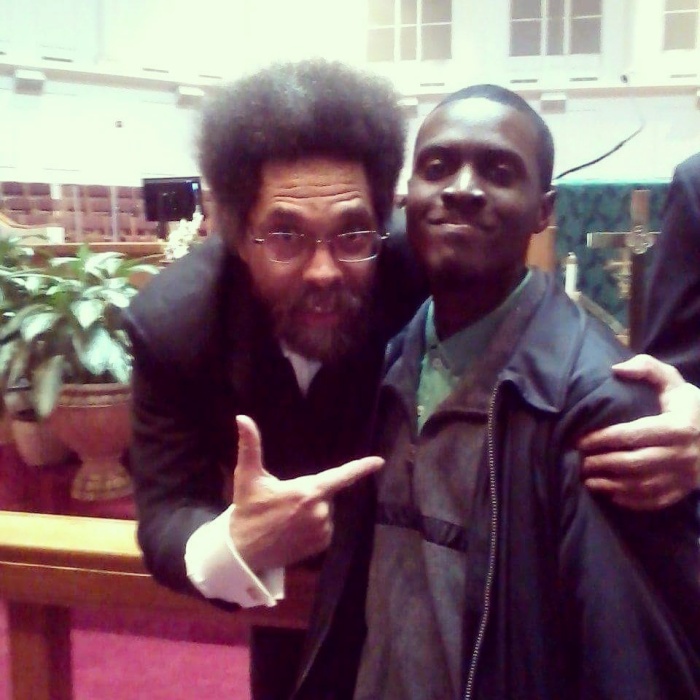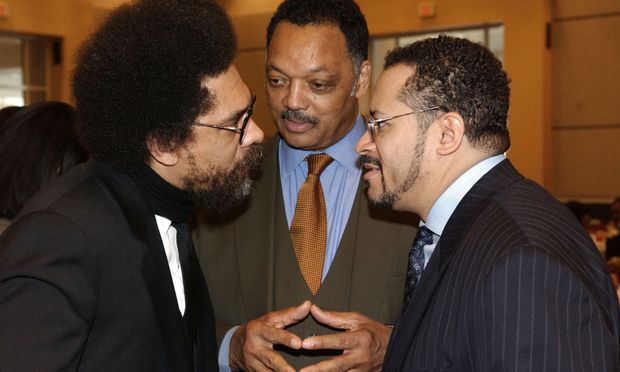
“The righteous indignation of a Martin Luther King Jr. becomes a moment in political calculation and that makes my blood boil.”
–Dr. Cornel West
Arguably the most valuable aspect of democratic culture is the freedom afforded those who choose to dissent. Without constant, unimpeded criticism of the status quo societies collapse into paralysis or, in the direst of circumstances, one or another form of tyranny. Unfortunately, this ability to voice criticisms of power is not always taken advantage of. In fact, the temptation to succumb to ideological conformity is sometimes strongest in societies that purport to champion traditions of liberty. A textbook case of such conformity can be found in the two latest articles (here and here) by Georgetown professor Michael Eric Dyson in the establishment liberal journal The New Republic.
Responding to what he describes as Dr. Cornel West’s “rage against President Barack Obama”, Dyson condemns the former Princeton professor and public intellectual for his “callous disregard for plural visions of truth”, a malady that can be overcome only through “the prophet’s duty of pitiless self-inventory.” Undoubtedly, the desire to carry out a “pitiless self-inventory” is surely an essential characteristic needed to critically engage with the most pressing problems of the day, a characteristic Dyson ought to have in abundance, at least if he counts himself immune to the hypocrisies he now attributes to his erstwhile mentor.
 Among the many crimes appended to Dr. West’s bill of indictment are his impassioned criticisms of Obama’s defenders, who he accuses of sacrificing elementary principles of justice for access to centers of privilege and power. “West’s attacks on me were a bleak forfeiture of 30 years of friendship,” intones Dyson. “It was the repudiation of a fond collegiality and intellectual companionship, of political comraderie and joined social struggle.” Putting aside the tone of West’s criticisms, which are of marginal significance compared to the substance of them, it’s worth investigating what kinds of critiques led to the end of this companionship. Dyson’s original TNR piece features three YouTube videos. In one 43 second video Dr. West, during an interview with Amy Goodman of Democracy Now! , describes Obama as a “Rockefeller Republican in Blackface.” Presumably, this was posted to illustrate Dr. West’s penchant for “verbal brutalities”, a term Dyson used to describe West’s “hateful language” in his subsequent article. The two other videos feature a BBC appearance of Dr. West urging Obama not to become “the friendly face of American empire,” and another appearance on C-SPAN (quoted above) where he decries the hypocrisy of Obama conducting his swearing-in ceremony with Dr. King’s Bible while perpetuating policies (drone strikes in Pakistan, Yemen, and Somalia for example) that radically depart from King’s emancipatory message.
Among the many crimes appended to Dr. West’s bill of indictment are his impassioned criticisms of Obama’s defenders, who he accuses of sacrificing elementary principles of justice for access to centers of privilege and power. “West’s attacks on me were a bleak forfeiture of 30 years of friendship,” intones Dyson. “It was the repudiation of a fond collegiality and intellectual companionship, of political comraderie and joined social struggle.” Putting aside the tone of West’s criticisms, which are of marginal significance compared to the substance of them, it’s worth investigating what kinds of critiques led to the end of this companionship. Dyson’s original TNR piece features three YouTube videos. In one 43 second video Dr. West, during an interview with Amy Goodman of Democracy Now! , describes Obama as a “Rockefeller Republican in Blackface.” Presumably, this was posted to illustrate Dr. West’s penchant for “verbal brutalities”, a term Dyson used to describe West’s “hateful language” in his subsequent article. The two other videos feature a BBC appearance of Dr. West urging Obama not to become “the friendly face of American empire,” and another appearance on C-SPAN (quoted above) where he decries the hypocrisy of Obama conducting his swearing-in ceremony with Dr. King’s Bible while perpetuating policies (drone strikes in Pakistan, Yemen, and Somalia for example) that radically depart from King’s emancipatory message.
Again, ignoring the tone of West’s critiques, it’s undeniable that there is a thread that connects them, namely a principled opposition to imperial power and corporate criminality. Notably, even in the Democracy Now! video, despite its brevity, West brings attention to Obama’s “imperial foreign policy at work.” Indeed, if Dyson were truly interested in writing a “sharp polemic” (his self-description) he would at least devote some attention to these hugely consequential topics of global importance. Why else would they reappear in Dr. West’s critiques with such frequency and clarity? Strangely, Dyson’s “self-inventory” yields no results. As the intrepid sportswriter and Nation contributor Dave Zirin observed shortly after the publication of Dyson’s first piece:
The word ‘Palestine’ or ‘Palestinian’ does not once make its way into Dyson’s piece. Neither does ‘Wall Street’ or ‘immigration.’ The word ‘drones’ only comes up in a quote attributed to West. We can debate how sincere West’s commitments are to these issues or whether they are a cover for his hurt feelings and heartbreak that Dyson posits is at the root of all the discord. But they should be reckoned with.
Likewise, author and investigative journalist Max Blumenthal, in a piece written for AlterNet, observed, “BDS might be sweeping American campuses, but Dyson has been largely silent on Israel’s endless occupation. Dyson carps about character assassination, but he is reticent on drone assassinations. Since Obama entered the Oval Office, Dyson has had much more to say about Nas than the NSA.”
Moreover, Dyson’s second article—one which he introduces as “a few lines to address the most salient responses,” to his original article—also devotes zero attention to drone warfare, Israeli criminality, NSA surveillance or imperial power quite generally. Briefly, Dyson addresses this oversight in his second article, arguing he would “leave the breadth and depth of West’s political activities to his advocates or biographers,” since he was more interested in “probing the vituperation that clouds West’s political stances no matter their variety or virtue.”
Discarding the fact that one doesn’t have to be an “advocate” or a “biographer” to expound on Dr. West’s or anyone else’s “political activities” (how one could host a political show on MSNBC with this standard is a mystery to me), that Dyson chooses not to inspect, in the least, the “variety and virtue” of West’s criticism of Obama only reinforces the reasonable suspicion that Dyson is either unwilling to denounce, or more insidiously, in complete agreement with these policies. Particularly glaring is this oversight since it was explicitly brought to his attention via Zirin’s critique, providing him ample opportunity to dispel any false assumptions.
Incidentally, what of the “vituperation” that “cloud’s” Dr. West’s criticism? Is that a crime? Uncontroversially, compared to words that would be uttered by the victims of Obama’s drone policies West would likely be counted too generous. Not only have approval ratings for Obama’s policies in Pakistan equaled those earned by President Bush, an impressive feat, but the New York Times recently reported that drone strikes in Yemen and Pakistan have “incited deep resentment toward the United States” (my emphasis). That this “deep resentment” may sometimes find its way to the Oval office and is sometimes directed at the man who, in the wake of the tragic killings of two western hostages in Pakistan, took “full responsibility” for drone policy is not only understandable but perfectly rational. Is it completely inconceivable that Dr. West may empathize with their outrage? Rather than criticize those who are filled with resentment over these criminal policies, Dyson ought to dedicate more time to trying to stop these policies that foster such righteous fury.
 And this is where Dr. Dyson and Dr. West part ways. While Dyson falsely accuses West of having his judgment clouded by “vituperation”, his own judgment is, it seems, irreversibly clouded by infatuation, not with the individual that is President Obama, but the power and achievement that he embodies (a form of power that is, at bottom, very reactionary). Examples of this infatuation are as plentiful as they are cringe-inducing. Whether it’s Dyson’s impassioned MSNBC speech announcing his talent in “riding the Obama bandwagon hard” or his less comical, but equally troublesome, appeal to 2012 voters to “join me” in “helping [Obama].” As for sustained criticism? Dyson once “riled the White House” when he bravely denounced Obama as a “gifted leader whose palpable discomfort with discussing race made him a sometimes unreliable and distant narrator of black life.” With critics like this who needs commissars?
And this is where Dr. Dyson and Dr. West part ways. While Dyson falsely accuses West of having his judgment clouded by “vituperation”, his own judgment is, it seems, irreversibly clouded by infatuation, not with the individual that is President Obama, but the power and achievement that he embodies (a form of power that is, at bottom, very reactionary). Examples of this infatuation are as plentiful as they are cringe-inducing. Whether it’s Dyson’s impassioned MSNBC speech announcing his talent in “riding the Obama bandwagon hard” or his less comical, but equally troublesome, appeal to 2012 voters to “join me” in “helping [Obama].” As for sustained criticism? Dyson once “riled the White House” when he bravely denounced Obama as a “gifted leader whose palpable discomfort with discussing race made him a sometimes unreliable and distant narrator of black life.” With critics like this who needs commissars?
Graphic as these testimonials are, they are of secondary importance to what Dyson doesn’t say and what these silences imply. Historically, it has always been incredibly easy to tear down public figures, especially those as vocally anti-authoritarian as Dr. West, on the grounds that they are uncivil or too vigorous in their criticism. Take the example of Native American Studies professor and Palestinian solidarity activist Steven Salaita. After condemning Israeli atrocities in the Gaza Strip during the 51 day massacre last summer he was denied a teaching position at the University of Illinois at Urbana Champaign. Reacting to Salaita’s condemnation of Israeli crimes, university Chancellor Phyllis Wise declared that UIUC could not tolerate “personal and disrespectful words or actions that demean and abuse either viewpoints themselves or those who express them”, a justification the widely read Academe Blog deemed “ridiculous.” Fundamentally, Dyson’s dissatisfaction with Dr. West is of the same brand.
Without venturing into hagiography, which is always an unattractive trait for those genuinely committed to critical thought, it’s difficult to overstate the importance of Dr. West as a voice of dissent and social uplift, not only in the Black community but in the United States as a whole. From the numerous arrests that he has undergone in the spirit of grassroots civil disobedience, to his outreach to the younger generation, to his defense of political prisoners like Mumia Abu Jamal and Palestinians languishing in the open air prison of the Gaza Strip, no amount of “philosophical meditation on prophetic vocation, scholarly craft and writerly art” can diminish his contributions to our national discourse and the movements that spring from them, a combination that is helping to construct a more just society. Legendary German socialist Rosa Luxemburg famously remarked that “those who do not move, do not notice their chains.” It’s about time Dr. Dyson joined Dr. West and noticed his own.
Sources:
http://www.thenation.com/blog/204769/cornel-west-not-mike-tyson
http://academeblog.org/2014/08/22/chancellor-phyllis-wise-explains-the-firing-of-steven-salaita/
http://www.pewglobal.org/2012/06/13/global-opinion-of-obama-slips-international-policies-faulted/
http://www.nytimes.com/2015/04/25/opinion/regret-over-a-drones-deadly-damage.html?smid=fb-share
http://www.chicagotribune.com/news/nationworld/chi-warren-weinstein-killed-20150423-story.html


